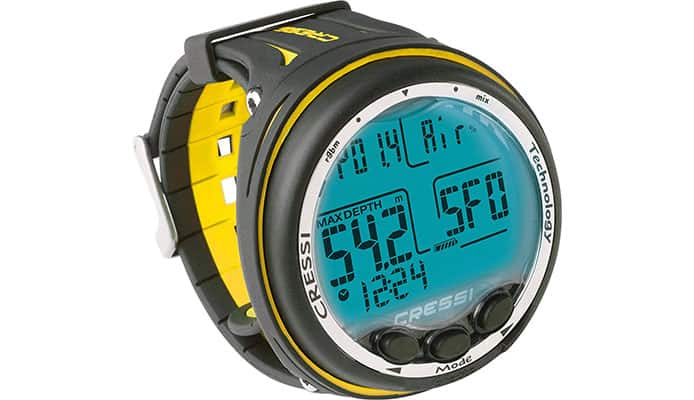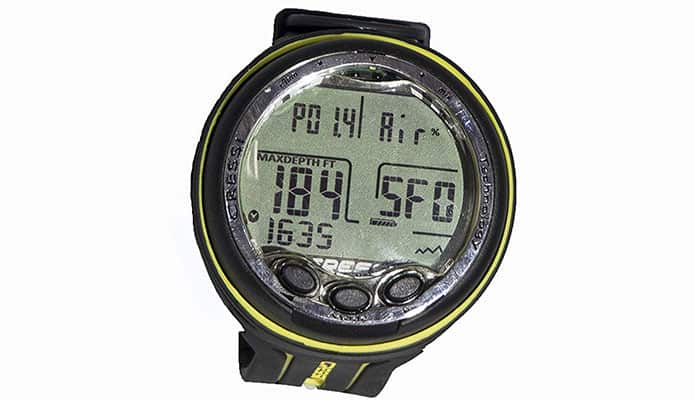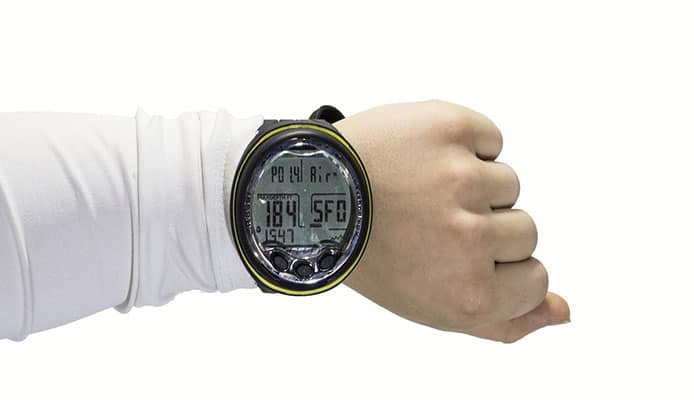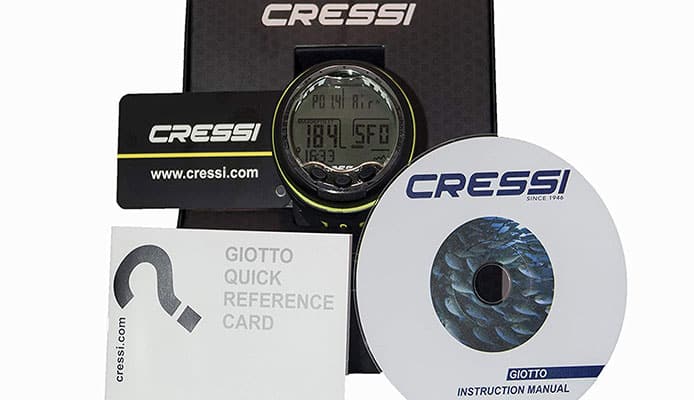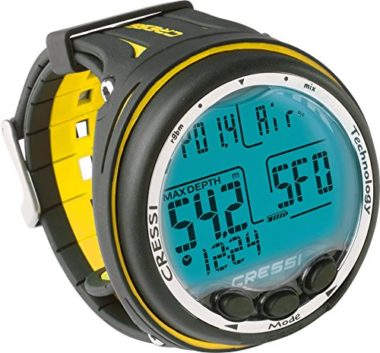Cressi Giotto Mixed Gas Wrist Diving Computer
- What Makes This Dive Computer Stand Out
- A multi-gas dive computer with nitrox (two mixtures), air and gauge mode
- Permits gas switching during a dive
- Can be fully reset to support multiple dives by different divers in a day
- High-definition screen and Priority Compartment Digit Display (PCD) display
- The three button interface and intuitive menu make navigation easy
- Built-in clock, calendar and chronograph
- Low profile and ergonomic design for comfort
- Compact and lightweight, ideal for traveling with
- User-replaceable battery
- A good looking dive computer available in a range of attractive colors
Dimensions: 2.6″ x 1″/65 x 27mm (D x H)
Screen Size: 45mm x 35mm
Weight: 4.77 oz./135 g
Algorithm: Cressi RGBM based on the Haldane/Wienke
PO2: 1.2 bars and 1.6 bars
FO2: 21% – 99%
Maximum Operating Depth: 120m/394ft
Features
Modes: Air, nitrox, gauge, plan, and watch mode with a built in calendar and chronograph.
Audible and Visual Alarms: It sounds alerts and lights up the screen for PO2, CNS toxicity, ascent rate, DECO, DECO bypass, maximum depth, and dive time.
Cressi RGBM Algorithm: Modified 9-tissue Haldane/Wienke model. It offers three levels of customization for safety-conscious divers and has an optional deep stop.
Oxygen Toxicity Indicator: The toxicity level of oxygen is displayed in a graphical format.
Backlit Display: For visibility in low light and diving at night, the display lights up at the sound of an alarm or press of a button.
Three-Button Interface: Setting up the Giotto and navigating around the software is easy.
Programmable Units: You can set your preferred units of measure, either metric (meters and C°) or imperial (feet and F°).
High Definition Screen: The display is sharp and the information is easy to see.
PCD Display: Priority Compartment Digit Display with clearly separated sections making it easy to take in multiple data without delay or confusion.
Protective Face Screen: It protects the display from damage during a dive. This screen is replaceable.
Safety Stop Countdown Timer: The safety stop indicator has a three-minute countdown timer.
Altitude Setting: It allows four levels of altitude adjustment, the highest being 3,700 meters (12,139 ft).
Full Reset: It can be fully reset and used by multiple divers in a single day.
Dive Log and Connectivity: It can store up to 75 diving hours. This data is downloadable to a computer via a USB cord sold separately.
Specifications
Dimensions: 2.6″ x 1″/65 x 27 mm (D x H)
Screen Size: 45mm x 35mm
Weight: 4.77 oz./135 g
Algorithm: Cressi RGBM based on the Haldane/Wienke
PO2 Value: 1.2 bars and 1.6 bars
Oxygen Level (FO2): 21% – 99%
Dive Logbook Memory: Up to 75 dive hours
Altitude Level: Up to 3,700 meters (12,139 ft)
Maximum Operating Depth: 120 meters/394 feet
Data Acquisition Interval: 20 seconds
Battery: CR2430, Approx. 3-year battery life with 50 dives/year, user-replaceable
User Experience
Size and Fit: The Cressi Giotto is pretty big! The large face helps with readability. The extra-long strap fits well over a wet suit or drysuit. To ensure the size isn’t in the way of diving, it is lightweight and has an ergonomic design. It is a beautiful computerized dive watch and even has a watch mode but is too big to rock as a wristwatch.
Ease of Use: The simple three-button interface and intuitive menu system make configuration and navigation easy. Due to the advanced functionality, it can be a bit difficult for first-time users to figure it out but the manual helps a lot, and operating the Giotto soon becomes an effortless task. You will also be able to replace the battery yourself without having to acquire any special tools.
Readability: Equipped with a large, high definition screen that is complemented by large digits and a Priority Compartment Digit Display (PCD) where the parameters are clearly separated by lines, divers have no problem reading the information conveyed even in emergencies. At night or in poor underwater visibility conditions, the screen is backlit. If you test the backlight while on land, it will appear dim but it actually glows bright underwater.
Diving Capabilities: The Cressi Giotto dive computer software processes all critical dive data from the depth and dive time to saturation and desaturation calculations of air and Nitrox dives. It monitors oxygen toxicity and processes nitrogen release and absorption. It also works as a depth gauge and bottom timer in gauge mode.
For dives with nitrox, you can use two different gas mixtures during the same dive. The computer allows you to set the oxygen percentage (FO2) between 21% and 99% and the PO2 value between 1.2 bar and 1.6 bar. It permits switching from a nitrox dive to an air dive during a dive.
A mixed gas computer designed to support multiple dives in a day with different gas mixtures while still adhering to safe diving practices, the algorithm can make accurate decompression calculations for multiple dives with various mixtures. It can also be completely reset multiple times in a day.
During a dive, it provides critical data such a depth, dive time, decompression, ascent rate, water temperature, oxygen toxicity, and PO2. It also issues acoustic and visual alerts for safety stops, deep stops, high PO2, CNS toxicity, ascent rate violation, maximum depth, and dive time. After a dive, it displays the saturation time, surface interval, and no-fly time.
The algorithm model is based on the 9-tissue Haldane and Wienke models and it incorporates RGBM factors and a deep stop option. This model is regarded as liberal and it offers three customization options so beginners and safety-conscious divers can choose a more conservative setting.
Even as a more advanced recreational diving computer, there are capabilities the Cressi Giotto doesn’t have. Missing features include a freediving mode, a built-in compass, air integration, rebreather mode, and trimix capability.
Durability: Cress dive computers are known for quality and durability and the Giotto is no exception. Made entirely by the company itself from the design, software to the final assembly, they had complete control of the quality and they didn’t drop the ball. A modular design, a high-quality composite material with stainless steel accents, and top-notch workmanship make it not only rugged and long-lasting but also elegant and one of the best-looking diving computers!
Pros:
- Air, nitrox, gauge, and watch mode
- A mixed gas computer that can handle two different nitrox mixtures
- Allows switching of gases during a dive
- Easy navigation and set up with three buttons
- Sharp and clear high-resolution display
- Ability to completely reset it multiple times in a day
- Accessible pricing and a fantastic value
Cons:
- The PC/Mac USB connector is sold separately.
- As a more advanced computer, it can be a little complicated for first-time users initially
- Doesn’t have a freediving mode, rebreather mode, air integration, or compass
- Too large to wear as a regular watch
You might also be interested in:
Cressi Leonardo Dive Computer Review
Stuhrling Aquadiver Dive Watch Review
Overall Rating
Price: 100% – The Giotto is priced slightly above entry-level diver computers and rightly so as it has advanced capabilities you will only find in more expensive models. It is also versatile and durable and of incredible value!
Ease of Use: 95% – The three-button interface is simple, the menu system fairly intuitive and the readability is top-notch. Due to the advanced functionality, there is a small learning curve for beginner divers at first.
Design: 95% – Excellent design in terms of intuitiveness, ruggedness, ergonomic comfort, portability, and style. It is one good looking computerized dive watch and it even has a watch mode. Too bad that it is too large to wear as a wristwatch!
Functionality: 95% – As an intermediate level scuba diving computer, the features, and functions of the Giotto are on point.
Overall: 96% – An advanced recreational scuba diving computer that is packed with amazing features and capabilities and offered at an unbeatable price! Highly capable yet user-friendly and reasonably priced, it suits both intermediate and beginner scuba divers.
Globo Surf Overview
If you’ve been diving for a while now and feel that your entry-level dive computer isn’t cutting it anymore, The Cressi Giotto is exactly what you need. A mixed gas computer that will allow you to use two different nitrox mixtures switch gases while diving, and dive multiple times in a day, will enable you to take your diving to the next level while ensuring you are safe. If you’re looking for a first diving computer, the Giotto is beginner friendly and is all you will need for a long time as it will still meet your needs as your skills grow. Happy Diving!
Single Scuba Products Reviews:
- Cressi Giotto Dive Computer Review
- Suunto Zoop Novo Dive Computer Review
- Mares Smart Wrist Dive Computer Review
- Oceanic Geo 2.0 Dive Computer Review
- Seiko Diver SKX009K1 Dive Watch Review
- Casio Men’s Sport Analog Dive Watch Review
- Citizen Watches BN0151-09L Promaster Dive Watch Review
- AquaJet Dive H2 – Flying Hydrodynamic Underwater Scooter Review
- Cosmic Plus Dive Computer By Deepblu Review



